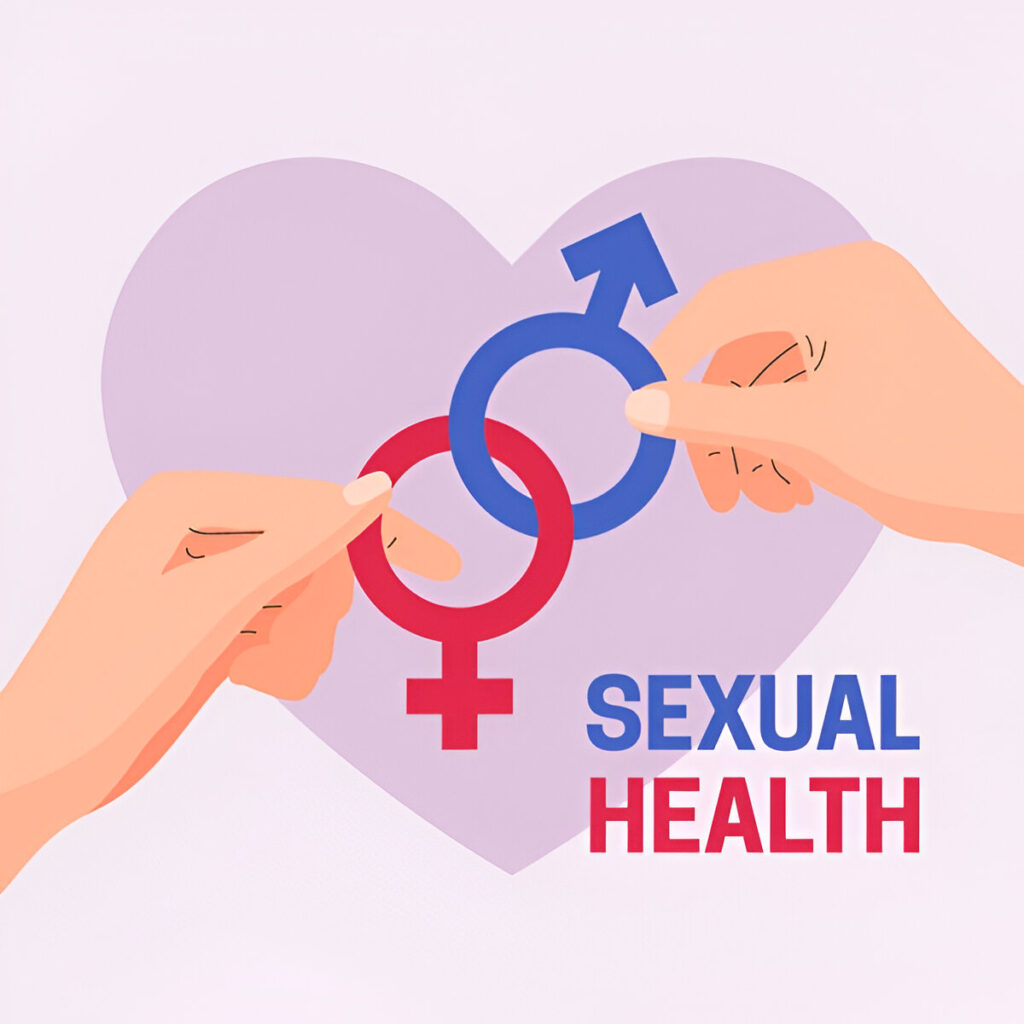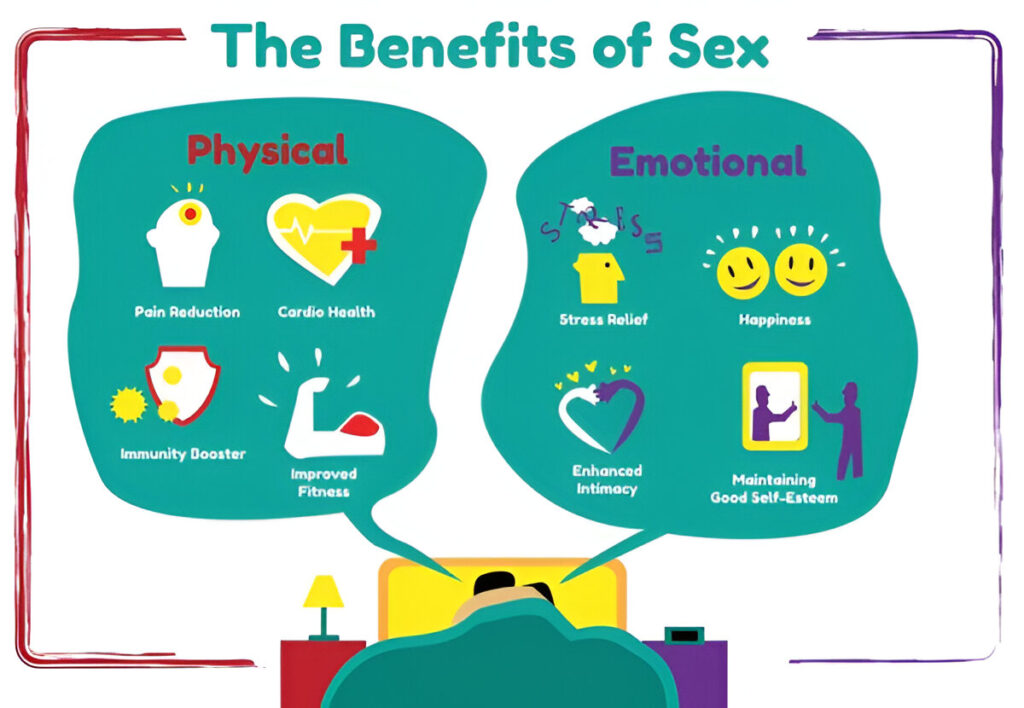Sexual health affects physical, emotional, and social well being. The WHO defines what is sexual health as physical, emotional, mental, and social well being related to sexuality. Beyond sickness or dysfunction, it emphasizes respect, consent, and safe practices for personal growth and meaningful relationships. Sexual health is complicated and misunderstood despite its significance. Due to a lack of tools, information, and supporting healthcare, many people have misunderstandings, stigma, and impediments to a healthy sexual life.
Sexual health, its causes, and its obstacles are examined in this article. We seek to assist people make educated choices by addressing body image, consent, sexual health concerns, and successful techniques. We will also examine how education, healthcare, and supporting policies foster sexual wellness. We want readers to understand sexual health and take actions to have a balanced and healthy life.
What is Sexual Health?

Sexual health encompasses physical, emotional, mental, and social well being. The World Health Organization (WHO) defines sexual health as respectful, safe, and rewarding relationships and the right to make informed sexual and reproductive life choices. This definition recognizes that a good sexual life is essential to well being.
Being confident in one’s wants, limits, and body is also important for sexual wellness. The right to knowledge, healthcare, and resources to make safe and healthy choices is included. Sexual health also emphasizes consent, respect, and good communication in partnerships. Recognizing these characteristics helps people make responsible choices and live a meaningful life, creating a more accepting society.
Components of Sexual Health
Multiple components of sexual health make to a comprehensive view of well being. Physical health, mental well being, emotional stability, and social variables all contribute to a good sexual life.
- Physical Health: Physical health encompasses reproductive health, safe sexual behaviors, and STI prevention. Physical sexual health requires regular checkups, contraception, and knowledge of personal health concerns.
- Mental Health: Mental health greatly affects sexual health. Sexuality perception may be affected by stress, anxiety, and self esteem. Good mental health promotes self acceptance, confidence, and open communication with relationships.
- Emotional Stability: Maintaining emotional stability in sexual relationships entails balancing love, trust, and intimacy. A healthy emotional basis helps build fulfilling partnerships.
- Social factors: Culture, society, and religion may shape sexuality views. These variables may influence sexual health ideas and actions. Transparent sexual health talks decrease stigma and promote good habits.
Each part supports a balanced approach to sexual health, stressing that it is a multifaceted issue that requires care, education, and educated decisions.
Importance of Sexual Health in Daily Life

Sexual health affects physical, mental, and emotional health, altering quality of life. Sexual health promotes personal growth and societal peace via safe behaviors, self awareness, and responsible partnerships. Knowing and practicing safe sex may avoid STIs and unexpected pregnancies, which can affect personal and family life.
Confidence and self esteem from good sexual health may boost mental health and emotional resilience. Being aware of your rights, limits, and requirements helps you communicate, create trust, and form respectful relationships. Societies that encourage comprehensive sexual education and resources eliminate stigma, empower people, and improve communal well being.
Including sexual health in everyday life improves personal well being and promotes a more welcoming society. This holistic approach lets people live a balanced, healthy life with the ability to make educated decisions in a supportive atmosphere.
Dimensions of Sexual Health
Sexual Orientation and Gender Identity
Sexual orientation and gender identity define us and affect sexual health. Sexual orientation refers to who a person is romantically or physically attracted to, whether opposite, same, both, or no special attraction. There are heterosexual, gay, bisexual, and asexual orientations. Accepting one’s sexuality may improve self esteem and mental health.
Gender identification is how people see themselves as gendered, not sexual orientation. Transgender, gender fluid, and non binary identities may result from this. Sexual health and well being depend on society’s acceptance of gender identities.
Respecting sexual orientation and gender identity variety lets people live genuinely and feel appreciated. In diverse communities, individuals may feel safe obtaining sexual health treatments and resources without condemnation. This assistance helps people live happier lives and feel secure in their identity and community.
Body Image and Self Esteem
Sexual health is affected by body image and self esteem. We judge our look, form, and attractiveness by our body image. Positive body image boosts confidence, enabling individuals to enjoy relationships without concern. However, a poor body image may cause self consciousness and tension, which can affect sexual relationships and well being.
Self esteem encompasses our ability, looks, and worth. High self esteem helps people establish boundaries, convey their needs, and sustain good relationships. In contrast, poor self esteem may cause anxieties about relationships, consent, and personal needs.
Self care, self acceptance, and positive influences from friends, family, and society promote a good body image and self esteem. Understanding that every body is unique and deserves respect may help people love themselves and form good relationships. This approach improves sexual health and fosters a supportive, respectful community.
Consent and Boundaries
Healthy relationships and sexual wellness need consent and limits. Sexual health consent involves freely participating in an action. Consent must be unambiguous, passionate, and voluntary. If one partner feels uncomfortable, permission may be revoked at any moment.
We create personal boundaries with others regarding safety and respect. We have physical, emotional, and mental boundaries to defend our health. Setting limits lets people express their comfort and prevent uncomfortable circumstances. Respecting others’ limits demonstrates caring and understanding, whereas not doing so may cause injury and mistrust.
Open discussion about consent and limits is key. Trust, respect, and understanding develop in partnerships when parties feel safe expressing their needs and listening. Learn about consent and boundaries to protect yourself and improve your relationships. This promotes a culture where everyone feels empowered to make safe, educated sexual health choices.
Key Factors Affecting Sexual Health

Biological and Physical Factors
Biological and physical factors affect sexual health. Genetics, hormones, and physical health may affect sexual function and desire. Estrogen and testosterone impact sexual development and behavior. These hormones alter sexuality and appearance throughout puberty.
Physical disorders including diabetes, heart disease, and hormone imbalances may affect sexual health. Certain illnesses might diminish energy, induce discomfort, or make intimate activities difficult. Physical changes with aging include libido, vitality, and health.
To make educated sexual health choices, individuals must understand these biological and physical components. Healthy eating, exercise, stress management, and regular checkups may improve sexual health. When people realize how their physical health affects their sexual health, they may take proactive actions to maintain a healthy balance and seek medical help.
Psychological Influences
Sexual health and well being are also influenced by psychology. Sexuality is influenced by emotions, mental health, and self perception. Stress and anxiety may reduce intimacy and make sexual encounters difficult. Low self worth or self image may also hinder intimate connection.
Mental health conditions including melancholy, anxiety, and trauma may affect sexual desire and confidence. Some people dread intimacy due to prior trauma or mental health issues, making it hard to build relationships. Instead, self esteem and mental stability promote healthy sexuality.
Psychological impacts on sexual health may be improved by therapy, self care, and stress management. Open talks about mental health may build trust in relationships and help people overcome psychological hurdles. A healthy and balanced personal life requires understanding the influence of mental health on sexual health.
Societal and Cultural Impacts
Society and culture strongly influence sexual health ideas. These variables may help or hinder sexuality exploration. Culture shapes acceptable conduct, which may impact how freely individuals discuss sexual health. Some cultures consider sexuality private or taboo, making it difficult for people to get treatment.
Social expectations about gender roles, relationships, and families can affect sexual health perceptions. Men and women may have severe behavior requirements in communities that stress gender roles. This may urge individuals to conform rather than express themselves.
Religious and familial values may also affect sexual health decisions. These may restrict personal choices on relationships, contraception, and marriage. As communities embrace diversity, inclusiveness and open sexual health talks are expanding.
A supportive community that promotes sexual health education and open communication may eliminate stigma and promote healthy habits. Understanding social and cultural factors helps people make values based, well being promoting decisions.
Access to Education and Healthcare
Education and healthcare provide people the tools to make educated sexual health decisions. Sexuality education covers reproductive health, safe sex, and consent accurately. This education helps people preserve their health, understand their bodies, and create healthy relationships.
Unfortunately, this information is not available to everybody. Sexual health education for youth is often hindered by cultural norms or lack of resources. Contraception and STIs may be unfamiliar to those without sufficient information, putting their health at risk.
Sexual health also requires healthcare. Regular medical checkups, reproductive health services, and contraception improve health. People in places with inadequate healthcare resources may struggle to get help, causing unnecessary health complications.
Access to education and healthcare may improve people’s lives by giving them the ability to make safe decisions. Access to accurate information and effective treatment helps people manage their sexual health, seek assistance, and live healthier lives.
Common Sexual Health Concerns

Sexual Dysfunction
Issues that hinder sexual enjoyment are called sexual dysfunction. These issues may affect anybody at any age, affecting physical pleasure and emotional connection. Men with erectile dysfunction have trouble getting or keeping an erection, while men and women with low sexual drive have trouble becoming orgasmic. These difficulties may be caused by aging, stress, medical conditions, and drugs.
Sexual dysfunction creates emotional stress, frustration, and relationship pressure for many. Feeling inadequate or low self esteem might also result. However, solutions are available, ranging from counseling and medication to lifestyle changes. Seeking help from a healthcare provider can help identify the underlying cause and recommend treatment options.
Sharing these difficulties with a spouse may reduce emotional stress and help discover answers. Sexual dysfunction may be controlled with care, allowing for a satisfying and healthy sexual life. Knowing that sexual health evolves with time and health circumstances may help treat patients compassionately and proactively.
Sexually Transmitted Infections (STIs)
Infections transferred via sexual contact are called STIs. Chlamydia, gonorrhea, syphilis, HIV, and HPV are common STIs. Condom use and frequent checkups may prevent STIs. However, without understanding and prevention, STIs may cause infertility, chronic discomfort, and even malignancy.
People may unwittingly transfer STIs like chlamydia because they have no symptoms. Sexually active people need regular testing to detect and treat illnesses early. Antibiotics treat bacterial illnesses like gonorrhea, whereas antivirals treat viral diseases like HIV.
STI education and prevention are crucial to minimizing their spread. To reduce STI stigma, treatment, diagnosis, and respectful sexual health communication are essential. When given proper knowledge and assistance, people may make safer choices and safeguard their health, reducing community infection rates.
Reproductive Health Issues
Reproductive health difficulties include infertility, pregnancy troubles, and menstrual abnormalities. These difficulties may hinder conceiving, maintaining a pregnancy, or reproductive functioning, affecting physical health, mental well being, and relationships.
Male and female infertility is prevalent. It might be caused by aging, hormone imbalances, lifestyle, or medical issues. Gestational diabetes and high blood pressure pose dangers for mother and child, needing careful monitoring and control.
Menstrual diseases including dysmenorrhea and irregular cycles are prevalent and may lower a woman’s quality of life. Healthcare and reproductive support are crucial for people with these challenges since early intervention may improve results and ease suffering.
Regular medical checkups and frank conversations about reproductive health may decrease stress and enhance quality of life. Support helps people manage these concerns and make educated family planning and reproductive health choices.
Gender Based Violence and Its Impacts on Sexual Health
Women and underprivileged groups are frequently victims of gender based violence (GBV). Violence may be physical, emotional, or sexual, and it harms victims’ sexual and mental health. GBV may cause trauma, fear, poor self esteem, and physical damage, which can affect a person’s safety and well being.
GBV survivors’ emotional trauma might make it hard to build trusted relationships and manage their sexual health. Sexual assault may cause injuries, STIs, unplanned pregnancies, and mental health difficulties including melancholy and anxiety.
Survivors need support, therapy, and healthcare to restore their lives. Reducing GBV requires empowering people to establish limits and teaching consent. Communities may create safe settings by fostering respect, equality, and zero tolerance for violence.
Resources and compassionate treatment help survivors recover. To provide a secure and healthy sexual life for everyone, gender based violence must be reduced and victims supported.
Sexual Health and Public Policy
Government Initiatives and Legal Framework
By providing treatment, education, and resources, government policies and laws encourage sexual health. Many countries have made sexual and reproductive health services accessible to all populations to improve it. The National Health Mission in India provides healthcare, family planning, and sexual health services to underserved areas.
Sexual health rights including contraception, safe abortion, and gender based violence are also protected by law. Indian laws such as the ART Bill and Surrogacy (Regulation) Bill provide safe and ethical fertility treatments for those seeking them.
A society where individuals may securely enjoy their rights requires legal safeguards. Laws prohibiting sexual orientation and gender identity discrimination provide a more inclusive atmosphere where everyone may get healthcare and assistance without judgment. Government measures that protect rights and facilitate healthcare access assist promote sexual health as a vital aspect of well being. Effective public health initiatives and strong legal frameworks make society healthier and more egalitarian.
International Standards and Goals
As part of global health and human rights, WHO and UN guidelines and objectives help states in improving sexual health. SDG 3 (Good Health and Well being) and SDG 5 (Gender Equality) of the UN Sustainable Development Goals (SDGs) emphasize sexual health and gender equality as critical areas for global improvement. The WHO emphasizes sexual health as an essential component of overall health and well being.
Comprehensive sexual education, gender based violence elimination, and healthcare access are among these worldwide aims. UNAIDS’ 90 90 90 HIV/AIDS objective requires 90% of HIV positive persons to know their status, 90% of those diagnosed to get treatment, and 90% of those on treatment to lower viral load. The mission aims to combat HIV globally and promote stronger healthcare systems worldwide.
Countries establish policies and initiatives to safeguard people’s sexual health and safety within international criteria. Nations pledge to reduce inequality, improve healthcare, and create supportive environments by implementing these principles. Countries working together to reach these criteria keeps sexual health a worldwide priority, helping people live healthier, happier lives.
Conclusion
Sexual health affects physical, emotional, and social well being. Sexual health encompasses respect, communication, and self esteem, not only safety. Education, healthcare, and open communication in partnerships help people make sexual health choices. Governments and international organizations promote sexual health via policies and initiatives.
Sexual health may be improved by learning, practicing safely, and seeing doctors. Take the first step toward a better, happier life by consulting healthcare professionals or trusted sources. Visit xxx for sexual health tips. These efforts build society and improve your health.
Frequently Asked Questions (FAQs)
What is sexual health, and why is it important?
Sexual health includes physical, emotional, and social well being. It helps people make educated decisions and develop trusting, respectful, and consenting relationships, ensuring a balanced, full existence.
How can I improve my sexual health?
Staying aware, practicing safe sex, and discussing needs and limits with partners improves sexual health. Sexual health is also supported by regular checkups, contraceptive education, and mental health.
What are common sexual health concerns?
Sexual dysfunction, STIs, reproductive health difficulties including infertility, and body image and self esteem issues are common concerns. Healthcare support and open communication are crucial to addressing these issues.
Why is consent important in sexual health?
Consent ensures that all parties willingly participate in an activity, making it safe and respectful. Clear communication and the ability to retreat develop trust and understanding in partnerships.
What government programs support sexual health?
Many governments provide healthcare, sexual education, and gender based violence safeguards. These programs provide assistance and encourage safe, educated sexual health decisions.




